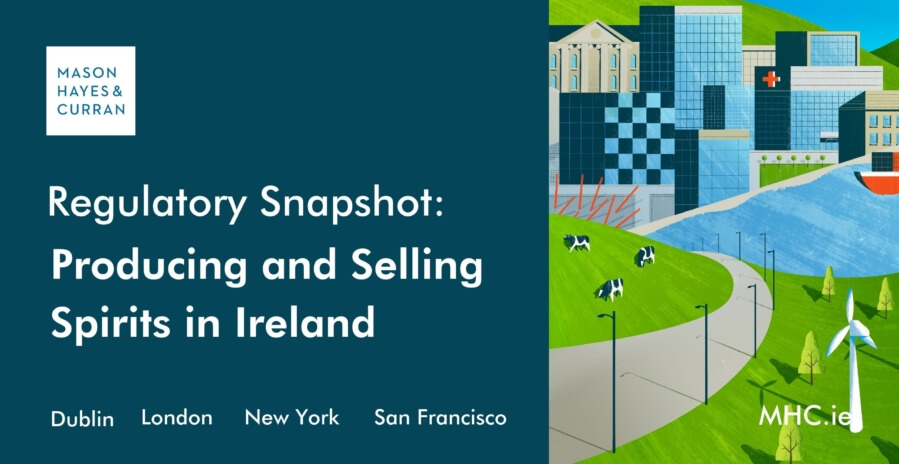
The Irish spirits industry is back to winning ways. After a drop of 16% in 2020, albeit on the back of 83.6% of growth between 2014 and 2019, Irish drinks exports have recovered by 19% and were worth €1.62 billion in 2021. According to Bord Bia’s Export performance and prospects report 2021-2022, the value of Irish whiskey exports recovered by 25% to an estimated €855 million. This is due in part to a trend towards premium, super premium and less but better options, something that the growing number of Irish craft gin distillers also stand to benefit from. Meanwhile, Irish cream liqueur exports recovered by 19% to an estimated €367 million.
Producing and selling spirit drinks in Ireland is a highly regulated activity. It involves manufacturers working with various government agencies to ensure that their sites remain fully compliant with all the necessary legal requirements. When selling their products, manufacturers must also ensure compliance with various rules relating to labelling and advertising. We provide a high-level overview of some of the important issues that producers should be aware of:
- Planning and Environmental Impact: Setting up a manufacturing operation can often require the development of a purpose-built production site requiring planning permission. In the case of products involving an ageing process, existing sites also often need to be extended to provide for added warehousing which can have added planning requirements. Producing spirits may involve discharges that are potentially damaging to the environment if not managed properly. An Environmental Impact Assessment Report and Natura Impact Statement may need to accompany the planning application. The relevant planning authority may decide to refuse a grant of permission where it considers that the development is unacceptable on environmental grounds. Licenses from the Environmental Protection Agency (EPA) and Irish Water can also be required.
- Manufacturer’s Licence: This is issued by the Office of the Revenue Commissioners (Revenue) and required by all distillers, rectifiers, and compounders of spirits. It allows the manufacturing of the liquor to which it refers, as well as wholesale of the manufactured liquor from the manufacturing premises. The licensing period expires each year on 30 September and the license fee is €500.
- Customs Bond: A warehouse/customs bond is a Revenue requirement for setting up a distillery. This involves a review by a Revenue officer to determine the level of financial security/bond to secure the excise duty at risk in the approved tax warehouse.
- Hazard Analysis and Critical Control Point (HACCP): All food businesses must develop and implement a documented food safety management plan based on Hazard Analysis & Critical Control Point (HACCP) principles to ensure that the food they are producing is safe. This plan is unique to each business and product, and the various microbiological, chemical, and physical hazards involved in all stages of the production process need to be analysed and accounted for.
- Feed Processing: The by-products of spirits production, e.g., waste malt, can be sold as animal feed, therefore becoming part of the food chain. This requires engagement with the Department of Agriculture, Food and the Marine (DAFM) which is the competent authority with primary responsibility for animal feed. As a starting point, DAFM requires that all producers and suppliers of feed material from industrial processing or food products register as feed business operators who have various responsibilities under food and feed hygiene legislation.
- Health and Safety: Because of the equipment, machinery and substances present, distilleries are inherently dangerous workplaces. For example, manufacturers need to have regard to “ATEX” regulations which apply to workplaces where explosive atmospheres might be present due to flammable dusts, vapours or gases.
- Geographical Indications (GIs): Irish Whiskey, Irish Cream Liqueur and Irish Poitín all have protected status as GIs. In order to sell a GI spirit drink, manufacturers need to demonstrate compliance with a specific Technical File for the GI before their product can be placed on the market as ‘Irish Whiskey’ for example. Under the Spirit Drinks Regulation (EU) 2019/787, DAFM and Revenue share responsibility for verifying compliance with the legal requirements related to GI spirit drinks including labelling - DAFM has assumed responsibility from the Health Service Executive (HSE) for the assessment and approval of labels for Irish Whiskey and Irish Poitín.
- Labelling: When labelling their products, producers need to be aware of the general requirements contained in the Food Information for Consumers Regulation (EU) 1169/2011. The Food Safety Authority of Ireland (FSAI) has published helpful guides to labelling for both Irish Whiskey and gin produced in Ireland.
- Trade marks: Trade mark protection for a new brand should be sought as soon as possible. It is important to ensure that the proposed name for the new product is available for use and registration, so searches should be carried out to avoid infringement. Class 33, of the Nice Classification system, is the relevant class for trade marks for spirits. Brand extension should be considered prior to filing, such as for confectionery, other food, clothing and accessories or restaurant and bar services. Consideration should be given to the proposed export markets and protection sought there too. It is often useful to register the label of the product as a trade mark. Many spirit producers sell their products in very distinctive bottles, so a 3D shape mark, for the bottle shape can be a useful enforcement tool, if registered.
- Advertising: The marketing of alcohol in Ireland is also strictly regulated. When promoting and selling their products, manufacturers should be aware of various legislative restrictions on advertising. For example, the Public Health (Alcohol) Act 2018, as well as industry codes such as the Responsible Retailing of Alcohol in Ireland Code, the Code for Sponsorships by Alcohol Drinks Companies, and the relevant sections of the Advertising Standards Authority of Ireland (ASAI) Code (section 9 is addressed specifically to the advertising of alcoholic drinks).
Conclusion
With domestic and export markets continuing their recovery, the Irish spirits industry is poised to take full advantage of a growing global appetite for the highest quality premium products with a rich heritage and strong brand identity. To take full advantage, producers must guard against any unnecessary disruptions to their business brought about by gaps in their regulatory strategies. Producers should consider these practical steps:
- Set aside time to map out the various regulatory requirements of your business having regard to areas such as those listed above. Schedule periodic revision sessions to reassess this.
- Maintain constructive and collaborative relationships with officers from regulatory agencies that the business must interact with.
- Monitor policy developments and upcoming legislation that could affect the industry and lead to changes to regulatory requirements. Consider membership of industry groups and trade associations who can help with this.
- Remain conscious of the regulatory responsibilities of partners in your supply chain and take steps to encourage and facilitate compliance throughout the supply chain where possible.
For more information on how to ensure regulatory compliance for your food business, contact a member of our Food, Agriculture & Beverage team.
The content of this article is provided for information purposes only and does not constitute legal or other advice.




